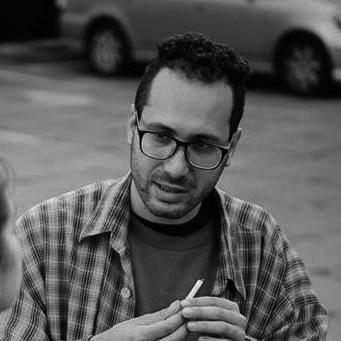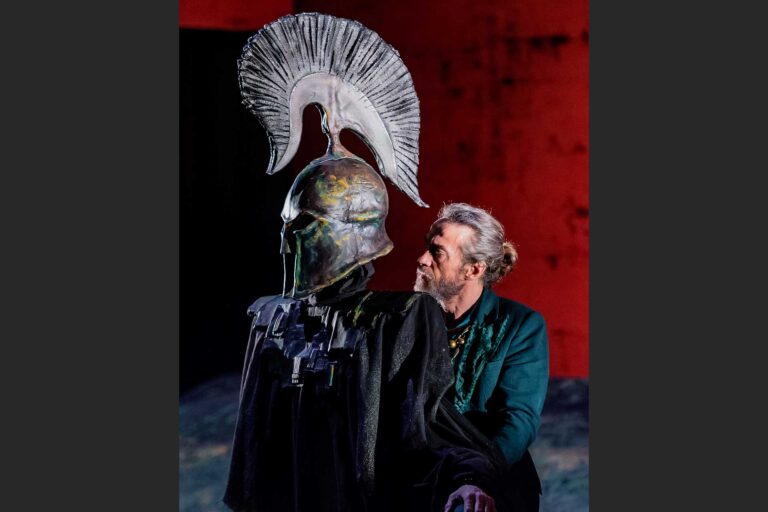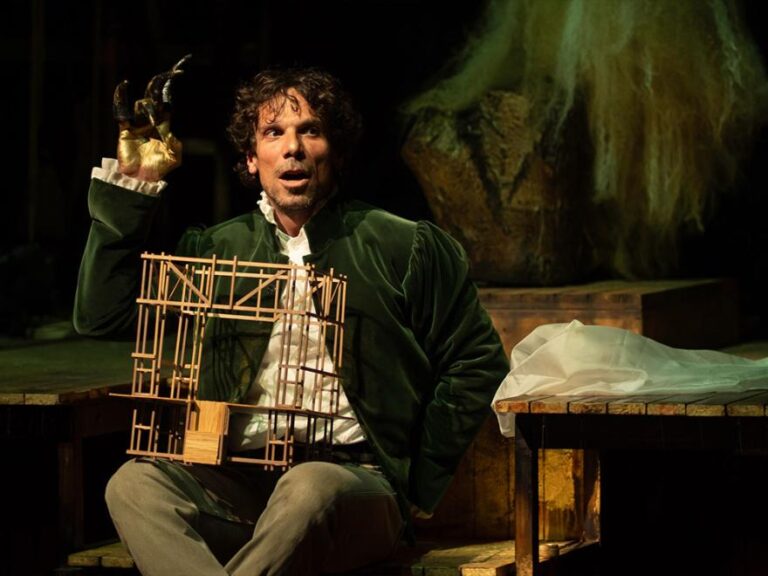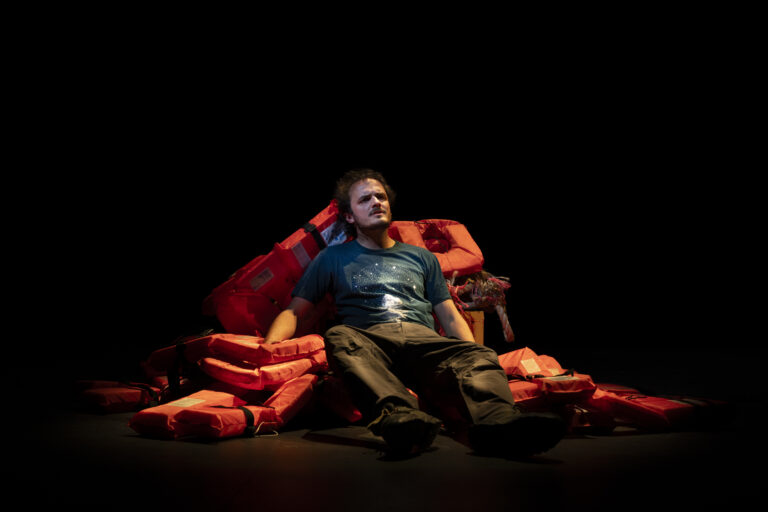Dopo aver parlato a ridosso dei fatti di luglio con Emre Yalçin e Semih Çelenk, proseguiamo il nostro focus sulla scena turca sempre con un occhio di riguardo agli eventi politici che si stanno susseguendo a un ritmo ormai frenetico. Simten Demirkol – docente presso la Anadolu University – ci racconta i rapporti fra teatro statale e indipendente, la repressione in atto anche in ambiente artistico, la condizione dei giovani registi e attori, provando a immaginare possibili linee di sviluppo futuro dei linguaggi scenici.
(english version below).jpg)
Partiamo da un evento che ha avuto una certa risonanza anche in Italia: la decisione da parte del Teatro Statale di Istanbul di non mettere più in scena opere internazionali ma solamente turche. Che ne pensi di questa decisione? È in qualche modo legata al recente tentativo di colpo di stato?
In realtà si è trattato semplicemente di una dichiarazione – peraltro neanche diffusa in forma ufficiale – del direttore artistico del teatro, che ha scatenato molte reazioni critiche da parte degli artisti attraverso i media. Successivamente la dichiarazione è stata in qualche modo “ricalibrata” dal direttore stesso, affermando che saranno messa in scena in prevalenza spettacoli turchi nell’intento di promuovere e supportare la scena locale. Il che suona comunque “curioso”, dal momento che non esiste alcun programma di sviluppo a sostegno dei giovani diplomati teatrali. Una volta terminati gli studi è infatti molto difficile proseguire la propria carriera: non c’è possibilità di accesso a tirocini né sono previsti sussidi, come magari succede in altri paesi. Quindi direi che la dichiarazione non ha molto senso, anche perché se guardiamo al programma della stagione possiamo notare come alla fine nomi stranieri ce ne siano.
Penso si sia trattato di un tentativo da parte del direttore di allinearsi alle direttive del governo, che tendono a essere di stampo conservatore. È, insomma, un tentativo di rendere l’arte turca più conservatrice ma occorre dire che ora come ora non c’è un terreno fertile per questo cambio: la maggioranza degli artisti e dei teatranti è dichiaratamente “di sinistra”… non so se tutto questo abbia a che fare con il tentativo di golpe, è forse troppo presto per dirlo.
Negli ultimi anni si sono succeduti parecchi eventi di grande rilievo: le proteste di Gezi Park, la repressione e il terrorismo, il tentativo di golpe… che effetto hanno tali eventi sulla scena teatrale?
La prima fase delle proteste di Gezi Park ha costituito uno dei movimenti di dissenso più pacifici della nostra storia, in cui hanno preso parte molti artisti. Tra l’altro sono stati rappresentati anche due spettacoli sulle proteste (uno degli attori ha poi subito un’investigazione da parte della polizia).
Purtroppo ciò che ne è seguito è stata una repressione violenta ed estremamente pervasiva, che ha generato parecchia autocensura da parte di chi si occupa di teatro. Oggi gli artisti sono preoccupati che la circolazione delle loro opere venga bloccata oppure che i loro testi non vengano nemmeno messi in scena. Di conseguenza, limitano la propria creatività e introducono nel proprio repertorio sempre più classici e spettacoli popolari che non possano generare controversie. Quindi, al di là dei primi momenti di forte solidarietà collettiva, la repressione ha sì influenzato (e influenza) la scena teatrale in un senso negativo.
Si tratta comunque di un processo che coinvolge l’intera società: le persone hanno generalmente paura di esprimere liberamente ciò che pensano e le stesse istituzioni, spesso quelle locali, esercitano parecchia censura non ufficiale. In più, com’è noto, dopo il tentativo di golpe ci sono stati numerosi licenziamenti nel sistema educativo e giudiziario così come in quello teatrale. È chiaro che tutti sentono la pressione di essere esautorati o marginalizzati.
Quali sono i rapporti fra teatro statale e scena indipendente in Turchia? Sono molti gli artisti che scelgono la seconda strada?
Il teatro statale è un’istituzione molto importante e rispettata in Turchia, che però oggi è composta soprattutto da compagnie stabili poco aperte al rinnovamento. A partire da circa 10 anni fa, sempre più artisti hanno deciso di intraprendere un percorso indipendente dopo gli studi. Questo perché, innanzitutto, è molto difficile riuscire ad accedere al circuito statale (occorre superare un esame molto impegnativo). Poi, nel caso si riesca a superare l’esame, esiste un periodo obbligatorio di almeno due anni di lavoro nella parte orientale del paese prima di poter anche solo avere la possibilità di essere assegnati a una delle grandi città dell’ovest. Si tratta di una misura comune a tanti impieghi pubblici: è un modo di sostenere lo sviluppo dell’area est della Turchia. Ma, al momento, la maggior parte dei giovani preferisce evitare questo passaggio (contando inoltre che le condizioni di sicurezza in quella zona sono peggiorate di recente). Oltre a questo, le posizioni nel teatro statale sono diventate meno appetibili di un tempo anche sotto il profilo artistico: per via delle gerarchie interne, un giovane artista è costretto ad attendere 5-10 anni prima di poter dirigere il suo primo spettacolo. In più, come dicevo in precedenza, i cartelloni si stanno riempiendo di spettacoli “popolari”, con una conseguente decrescita della libertà espressiva.
Quindi, lavorare nel teatro statale era molto ambito (si tratta comunque di un impiego di ruolo con anche altri benefit) ma oggi non c’è spazio per chi vuole mettere in scena un teatro sperimentale o politico ed ecco che sempre più persone si stanno riversando nell’ambiente indipendente.
Questo “esodo” ha consentito la formazione di una forte scena indipendente?
Ha creato molti spazi teatrali su tutto il territorio del paese, ma la loro sostenibilità a livello finanziario continua a costituire un problema. Non è come in Europa: generalmente gli artisti non riescono nemmeno a ripagarsi i costi di produzione con la vendita dei biglietti. Tuttavia, sono fiduciosa: credo che i giovani artisti indipendenti riusciranno a inventare qualcosa di nuovo, a elaborare nuovi linguaggi teatrali. Forse, l’influenza della tradizione islamica nella nostra società può rappresentare un’occasione di combinare diversi elementi culturali sul palco in maniera inedita. Per esempio, abbiamo avuto alcune compagnie che hanno importato dall’Inghilterra lo stile in-yer-face. All’inizio però le loro performance risultavano distanti dalla realtà, non era possibile capire fino in fondo il punto degli spettacoli. Allora hanno iniziato a introdurre espressioni e stilemi presi dalla vita urbana delle grandi città turche e penso che questo sia molto importante per avere un teatro che parli del presente, così come penso sia importante provare a recuperare elementi dalla nostra tradizione epica che possano “rinfrescare” il linguaggio scenico.
Difficilmente arriverà qualcosa di nuovo dalla riproposizione dei testi classici. È giusto che vengano messi ancora in scena, ovviamente, ma occorre rendersi conto che sono in qualche modo “scaduti”. Quindi, direi che in Turchia abbiamo bisogno di più testi inediti e di giovani drammaturghi.
Come lavorano di solito le compagnie indipendenti? Come collettivi o in maniera più classica con un regista?
Stiamo parlando di compagnie formate da artisti veramente giovani, dai 25 ai 35 anni. Si tratta di gruppi che si formano appena dopo che i membri hanno completato gli studi e generalmente lavorano come un collettivo, anche se alcuni di essi operano una sorta di rotazione registica (uno spettacolo viene diretto da uno dei membri, un altro spettacolo da un diverso membro, etc…). Penso comunque che la cosa più importante è che stiano scrivendo i propri testi: c’è un crescente numero di performance su temi sociali come le minoranze etniche o sessuali… Occorre tenere conto che la Turchia è un paese in cui la maggior parte delle persone ha una mentalità conservatrice. Da una parte è quindi positivo che si stiano intensificando gli spettacoli su questi temi, dall’altra risulta però difficile portarli all’attenzione di un pubblico ampio. Sarebbe pretenzioso dire che il teatro indipendente stia cambiando la società: chi va a vedere tali performance ha solitamente una mentalità affine a quella che viene espressa sul palco.
Potresti citare qualche spettacolo che dal tuo punto di vista ha creato un lascito nella scena turca o che magari ha avuto una ricezione controversa?
L’Arturo Ui’nin messo in scena dal Tiyatro Adam è uno spettacolo che si è guadagnato una grandissima reputazione, vincendo anche il più importante premio teatrale del paese (premio Afife). Si tratta di un testo classico ma, come è tipico della poetica del regista, viene rappresentato con uno stile che lo rende attuale e profondamente legato al presente.
Anche, Son Zanne (L’ultimo Zanne) di BO Sahne è una performance significativa su un ballerino di danza del ventre transgender. È una proposta interessante perché ha un andamento molto coinvolgente che però ti lascia allo stesso tempo anche triste e ti spinge a riflettere sulla condizione del protagonista, diventando così una spaccato generale sull’ambiente dell’intrattenimento di Istanbul.
Infine, uno degli spettacoli più controversi è stato quello del Dostlar Tiyatrosu su uno degli eventi più tragici della nostra storia recente, il massacro di Sivas del 1993 in cui numerose persone persero la vita arse vive in un hotel durante un festival. La compagnia ha assemblato riprese originali dell’evento e testimonianze, con un procedimento che per l’epoca era abbastanza nuovo.
///
[english version]
Let’s start with a news that affected Italy too: the decision by State theater in Istanbul not to stage foreign plays anymore but just Turkish ones. How do you comment the decision? Do you think it is somehow related to the coup attempt?
It was actually a statement – not even an official one – by the artistic director of the State theater that prompted a lot of criticism by Turkish artists via media and social media. After that the director sort of balanced his statement by saying that yes, theaters should be more likely to stage Turkish plays but it has to be done in order to support young professionals’ development. Which is kind of curious, if you think that we don’t have any development program for theater graduates. On the contrary, once they finish the academy they have to work hard to find their way. They cannot rely on any internship or small salaries as it is the case in other countries. So, in the end, the statement makes little sense. Besides, in the season of this year there are some foreign plays.
I think it was more an attempt to align theater direction to government’s one, which is pretty conservative. It is an attempt to have a sort of conservative art. But, again, such an art doesn’t really exist in Turkey right now: most of theaters and theater makers are leftist… In conclusion, I don’t know if this fact is related to the coup attempt, it is maybe too soon to tell.
During the last years you experienced a lot of political events: Gezi Park protests, repression and terrorism, the coup attempt… how all of these events affected the theater environment?
The beginning of Gezi Park was one of the most peaceful protest in history. Many artists took part in the movement. Also, there have been a couple of independent plays about these event (one of the authors was afterwards subjected to an investigation).
Unfortunately what came afterwards was a lot of pressure on the people that prompt a lot of self-censorship among theater makers. Artists are afraid that their work can be stopped or not shown at all so they’re limiting themselves and they’re filling the repertoires more and more with popular plays. The repression did affected artistic approaches.
But it’s something that concerns the whole society: people are generally afraid to express what they think and there was a lot of non official censorship by local governments, for example. Also, as maybe you know, after the coup there were dismissals in government establishment, in justice and educational systems and in theater too. So everyone feels the pressure of being fired or marginalized.
How is the relationship between independent theater and state theater in Turkey? Are there many artists who choose to be independent?
State theater is a very important and big establishment in Turkey but by now mostly stable and “closed” crews are working in it. Starting from 9-10 years ago, more and more people began to choose an independent path after the studies. First of all, it is very hard to get into state theater, since there is a very big exam. Secondly, if you pass the exam you are supposed to work for at least a couple of years in the Eastern part of Turkey before to get the possibility to be appointed to some of the big cities in the West. It’s something in common with other public profession: it’s a way to support the development of the eastern part of Turkey. But most of the young people didn’t want to walk this path anymore (also, safety condition in the eastern part worsened). Besides that, State theater began not to be such appealing from an artistic point of view: a young theater maker usually waits 5-10 years before to direct a play because of the hierarchy in the structures. Also, as I said previously, they are staging more and more classical popular plays and there is less room for artistic freedom.
State theater used to be very appealing. It was a tenure position with some other benefits. But now there is no room for a young artists who would like to do some experimental or political theater.
This “exodus” created a strong independent scene?
It created many independent stage all over the country but there is no money at all in the independent scene. It’s not like Europe: usually artists are not even paying the production with the tickets selling. However, I’m very hopeful: I think independent theater makers are going to invent something new, to create a new language. Maybe thanks to the influence of Islamic tradition, they have the chance to combine different cultures on stage. For example, there are some companies that imported in-yer-face kind of style from UK but at the beginning their plays were distant from society, you couldn’t really get the point of the show. After, they began to create their own in-yer-face style basing on underground culture of Istanbul or Ankara. So they introduced elements of the urban life in theater and I think this is really important as well as it is important to have some elements from traditional epics that could “refresh” theater language.
I think that it is difficult to make anything good or new out of classical texts. It is ok to stage them again of course. But they are not innovative: they kind of expired. So, yes, I would say that in Turkey we need more and more fresh texts and new playwrights.
How do young theater artists usually work? With a director or as a collective group?
We’re speaking about companies of very young theater makers, between 25 and 35. They form companies right after the school and some of them are working as a collective but most of the time they do a sort of directing turnover (one of them directs one play, one other directs another play…). But the most important thing is that they’re writing their own text: there are a lot of plays about social issues like minorities, LGBT people… Turkey is a country where the majority of the population has conservative views, so it’s good that they’re addressing these issues but at the same time it’s difficult to reach a broad audience. The spectators who are coming to see those plays are already really openminded people, so theater it’s hard to say that theater is changing the society on that level.
Can you mention some performance that have been significant in Turkish recent history? Also, there have been controversial performances?
Arturo Ui’nin staged by Tiyatro Adam was a play that very good reputation that also won the most important prize (Afife Award) for theater. It was staged in a way that could strongly relate with the current situation. The director uses to stage classical text but with a style that makes them new and actual.
Also, Son Zenne (The Last Zenne) by BO Sahne was a remarkable play about a transgender male belly dancer. It was interesting because it was an amusing play but at the same time made you to reflect and feel sad about the story of the main character in the end, it was a critical reflection upon the entertainment society in Istanbul.
Certainly, one of the most controversial plays was the documentary-play about Sivas Massacre by Dostlar Tiyatrosu: it dealt with a very tragic and recent event of our history by using real footage and people’s comments, which was something pretty new at the time.
L'autore
-

Giornalista e corrispondente, scrive di teatro per Altre Velocità e segue il progetto Planetarium - Osservatorio sul teatro e le nuove generazioni. Collabora inoltre con il think tank Osservatorio Balcani e Caucaso Transeuropa, occupandosi di reportage relativi all'area est-europea.







